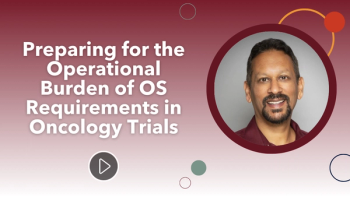
Explore how stronger collaboration and closed feedback loops can improve communication, change management, and site engagement in clinical trials.

Explore how stronger collaboration and closed feedback loops can improve communication, change management, and site engagement in clinical trials.

Steve Rosenberg, CEO, uMotif, discusses the challenges sites face with eCOA, eConsent, and ePRO platforms and the support needed to reduce technical burdens.

Last week’s top stories explored the push for digital-first clinical data systems, why cybersecurity must be central in CRO qualification, and how AI-driven contracting tools are helping sponsors cut delays and accelerate trial timelines.

The FDA has approved Eli Lilly’s Inluriyo (imlunestrant), the first oral estrogen receptor antagonist for adults with ER-positive, HER2-negative, ESR1-mutated advanced or metastatic breast cancer, based on Phase III EMBER-3 results showing a 38% reduction in risk of progression or death versus endocrine therapy.

In this video interview, Ananth Kadambi, VP of real-world evidence and modeling solutions at Certara, highlights how clinical operations teams must enhance patient tracking, engage data monitoring committees earlier, and plan subgroup analyses to meet FDA’s overall survival guidance.

Based on Phase III DESTINY-Breast09 results showing a 44% reduction in risk of progression or death versus standard therapy, AstraZeneca and Daiichi Sankyo’s Enhertu-pertuzumab combination could mark the first major advance in this treatment setting in over a decade.

In this video interview, Ananth Kadambi, VP of real-world evidence and modeling solutions at Certara, explains how integrating real-world evidence and predictive modeling early in development can streamline OS-focused trials while meeting regulatory and payer expectations.

Modernizing Clinical Trials: A Site-Centered Roadmap for the Future Simplifying startup, empowering sites through networks, and adopting evidence-based site selection frameworks can address enrollment bottlenecks, reduce dropout, and strengthen trial efficiency across the research ecosystem.

In this video interview, Ananth Kadambi, VP of real-world evidence and modeling solutions at Certara, discusses how model-informed drug development can help sponsors predict efficacy and safety outcomes to align shorter trials with FDA expectations for overall survival.

Michel van Harten, MD, CEO, myTomorrows; and Kyle McAllister, co-founder, CEO, Trially, discuss how artificial intelligence can reduce barriers for underrepresented patients and streamline prescreening and outreach to support clinical research participation.

In this video interview, Ananth Kadambi, VP of real-world evidence and modeling solutions at Certara, explains how emphasizing overall survival ties trial success to both efficacy and safety while also shaping payer and access considerations post-approval.

In Stage 1 of the Phase II LANTIC study, Ipsen’s novel recombinant molecule IPN10200 met its primary endpoint with significant improvement at week 4 versus placebo and showed longer duration of effect versus Dysport, with most patients maintaining meaningful response at week 24.

This episode of the Applied Clinical Trials Brief highlights a new global collaboration between two industry leaders, explores how site networks can address enrollment and retention challenges, and examines how generative AI is transforming clinical study reporting.

In this video interview, Ananth Kadambi, VP of real-world evidence and modeling solutions at Certara, outlines how FDA’s emphasis on overall survival in oncology trials requires stronger safety monitoring, subgroup planning, and patient tracking.

Real-world data from more than 58,000 older adults with type 2 diabetes and cardiovascular disease demonstrate that semaglutide lowers the risk of major adverse cardiovascular events, reinforcing its differentiated profile among GLP-1 receptor agonists.

In this episode of the ACT Brief, we spotlight an earlier interview with Ron Lanton, partner at Lanton Law, in which he discussed how rising drug costs, reduced FDA inspections, and potential tariffs on active pharmaceutical ingredients could increase costs and slow progress across the clinical research landscape.

An interim analysis of the TULIP-SC trial found that weekly subcutaneous delivery of Saphnelo significantly reduced disease activity in patients with moderate to severe SLE, offering a more convenient option with a safety profile consistent with IV administration.

In this video interview, Umesh Chaudhari, executive medical director and global program head of the C5 programs at Regeneron, describes how double-blind double-dummy design, site reminders, and patient engagement measures ensured high adherence with quarterly subcutaneous dosing in the NIMBLE trial.

A quick look at FDA’s 2025 transparency moves, what CRLs are (and aren’t), how FAERS works and its limits, who can report, and where the agency is applying AI.

In this video interview, Umesh Chaudhari, executive medical director and global program head of the C5 programs at Regeneron, explains how large sample size and stratification by immunosuppressant use ensured balance and consistent efficacy assessments in the NIMBLE study.

Maximizing AI’s potential in medical writing and regulatory submissions requires data standardization, objective content practices, and a streamlined document ecosystem that accelerates timelines while ensuring compliance.

In this video interview, Umesh Chaudhari, executive medical director and global program head of the C5 programs at Regeneron, describes how double-blind double-dummy dosing, standardized assessments, and site training ensured protocol adherence and data integrity in the NIMBLE trial.

The IDeate-Lung01 trial showed a 48% confirmed response rate with Merck’s B7-H3 directed antibody-drug conjugate in previously treated extensive-stage small cell lung cancer, with durable benefit observed across second- and later-line patients, including those with brain metastases.

In this week’s Applied Clinical Trials Brief, we recap three top stories: Novo Nordisk’s stepwise approach to AI adoption, new perspectives on eClinical technology as a growth driver, and expert insights on how recent policy changes could impact research funding and future therapies.

In this video interview, Umesh Chaudhari, executive medical director and global program head of the C5 programs at Regeneron, explains how NIMBLE showed cemdisiran achieved strong efficacy with partial complement inhibition and reduced disease worsening compared to combination therapy.

In this video interview, Umesh Chaudhari, executive medical director and global program head of the C5 programs at Regeneron, outlines how the Phase III NIMBLE trial showed cemdisiran improved daily living and clinical assessments in patients with generalized myasthenia gravis.

In this episode of the Applied Clinical Trials Brief, Shipra Patel, global therapeutic area section head for endocrinology and global head of pediatrics at Parexel, shares insights on what makes a standout research partner, how cross-functional teams support GLP-1 studies, the role of real-world evidence, and why patient retention will be critical to shaping the future of obesity drug development.

The pivotal trial showed Eli Lilly’s non-covalent BTK inhibitor pirtobrutinib significantly improved progression-free survival over bendamustine plus rituximab in untreated CLL/SLL patients, with overall survival trending in favor of Jaypirca.

In this video interview, Adrianne Rivard, senior community development manager at myTomorrows, explains why compliance with privacy standards and physician training are critical for safe and effective use of GenAI in clinical trial discovery.

Kate Gallin Heffernan, life sciences attorney at Epstein Becker Green, and Jim Kremidas, executive director, Association for MultiSite Research Corporations (AMRC), discuss how proposed policy changes could limit federal research funding, create uncertainty for clinical trial organizations, and slow the development of future therapies.